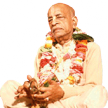Spiritual Form - an essential subject: Difference between revisions
(Created page with "Category:Essential Subjects <!----------------------- edit below this line -----------------------> <!------------------------ begin introduction text below --------------...") |
(Vanibot #0041: Moves Choose Another box to the end) |
||
| Line 2: | Line 2: | ||
<!----------------------- edit below this line -----------------------> | <!----------------------- edit below this line -----------------------> | ||
<!------------------------ begin introduction text below ------------------------> | <!------------------------ begin introduction text below ------------------------> | ||
Knowledge of the Supreme Absolute Truth does not necessitate negation of the material manifestation but understanding of spiritual existence as it is. To think that because material existence is realized in forms therefore spiritual existence must be formless is only a negative material conception of spirit. The real spiritual conception is that spiritual form is not material form. Brahmā appreciated the eternal form of the Lord in that way, and the Personality of Godhead approved of Brahmā's spiritual conception. In Bhagavad-gītā the Lord condemned the material conception of Kṛṣṇa's body which arises because He is apparently present like a man. The Lord may appear in any of His many, many spiritual forms, but He is not materially composed, nor has He any difference between body and self. That is the way of conceiving the spiritual form of the Lord. | |||
Srila Prabhupada's books, lectures, conversations and letters offer a comprehensive presentation of this essential subject as seen in the Vaniquotes '''[[Vaniquotes:Category: | Srila Prabhupada's books, lectures, conversations and letters offer a comprehensive presentation of this essential subject as seen in the Vaniquotes '''[[Vaniquotes:Category:Spiritual Form|Spiritual Form]]''' category. An introduction from his books is given below in the following 10 quotes. | ||
<!-------- end introduction text and don't touch next three lines ---------> | <!-------- end introduction text and don't touch next three lines ---------> | ||
---- | ---- | ||
== Quotes from Srila Prabhupada's books == | == Quotes from Srila Prabhupada's books == | ||
<!----------------- edit quote boxes below this line -----------------> | <!----------------- edit quote boxes below this line -----------------> | ||
{{VaniQuotebox| | {{VaniQuotebox|A spiritual form like the Lord's, either two-handed or four-handed, is attained by the devotees of the Lord either in the Vaikunthas or in the Goloka planet, according to the original nature of the soul|A spiritual form like the Lord's, either two-handed or four-handed, is attained by the devotees of the Lord either in the Vaikuṇṭhas or in the Goloka planet, according to the original nature of the soul. This form, which is cent percent spiritual, is the svarūpa of the living being, and all the living beings who participated on the Battlefield of Kurukṣetra, on both sides, attained their svarūpa, as confirmed by Bhīṣmadeva. '''(Bhagavad-gītā 1.9.39)'''}} | ||
{{VaniQuotebox| | {{VaniQuotebox|Anyone who does not accept the spiritual form of the Supreme Lord is counted among the atheists. Because Lord Buddha did not accept these Vedic principles, the Vedic teachers consider him an atheist|Anyone who does not accept the spiritual form of the Supreme Lord is counted among the atheists. Because Lord Buddha did not accept these Vedic principles, the Vedic teachers consider him an atheist. Although Māyāvādī philosophers pretend to accept the Vedic principles, because they do not accept the Supreme Personality of Godhead they indirectly preach Buddhist philosophy, or atheistic philosophy. '''(Teachings of Lord Caitanya, Chapter 25)'''}} | ||
{{VaniQuotebox| | {{VaniQuotebox|Anyone who trains the mind to turn from matter to the spiritual form of the Godhead by performance of the prescribed rules of devotional service can easily attain the kingdom of God, in the anti-material sky|In the Bhagavad-gītā it is said that if a man, at the time of death, concentrates his mind upon the form of the Personality of Godhead, Śrī Kṛṣṇa, and while so doing relinquishes his body, he at once enters the spiritual existence of the anti-material world. This means that anyone who trains the mind to turn from matter to the spiritual form of the Godhead by performance of the prescribed rules of devotional service can easily attain the kingdom of God, in the anti-material sky. And of this there is no doubt. '''(Easy Journey to Other Planets, Chapter 1)'''}} | ||
{{VaniQuotebox| | {{VaniQuotebox|Each and every living being has his individual position in one of the above-mentioned five different kinds of reciprocating means with the Lord, and in one's pure spiritual form of svarupa the relation becomes manifest without mundane affinity| Each and every living being has his individual position in one of the above-mentioned five different kinds of reciprocating means with the Lord, and in one's pure spiritual form of svarūpa the relation becomes manifest without mundane affinity. The kissing of the Lord, either by His wives or His young girl friends who aspired to have the Lord as their fiance, is not of any mundane perverted quality. '''(Śrīmad-Bhāgavatam 1.10.28)'''}} | ||
{{VaniQuotebox| | {{VaniQuotebox|Ignorance of the personal feature of the Lord is due simply to ignorance of the mixture of different modes. The impersonalist thus cannot conceive of the Lord's eternal spiritual form of eternal knowledge, bliss and existence|Ignorance of the personal feature of the Lord is due simply to ignorance of the mixture of different modes. The impersonalist thus cannot conceive of the Lord's eternal spiritual form of eternal knowledge, bliss and existence. The reason is that the Lord reserves the right of not exposing Himself to the nondevotee who, even after a thorough study of literature like the Bhagavad-gītā, remains an impersonalist simply by obstinacy. '''(Śrīmad-Bhāgavatam 2.5.24)'''}} | ||
{{VaniQuotebox| | {{VaniQuotebox|In His spiritual form, Krsna enjoys His spiritual energy, and that is the sum and substance of the Radha-Krsna pastimes. These pastimes can be understood only by elevated devotees|In His spiritual form, Kṛṣṇa enjoys His spiritual energy, and that is the sum and substance of the Rādhā-Kṛṣṇa pastimes. These pastimes can be understood only by elevated devotees. One should not try to understand the Rādhā-Kṛṣṇa potencies and pastimes from the mundane platform. Generally people misunderstand these as being material. '''(Teachings of Lord Caitanya, Chapter 31)'''}} | ||
{{VaniQuotebox| | {{VaniQuotebox|In our present state it is not possible to see God in His spiritual form because our material eyes and senses cannot conceive of a spiritual form. We cannot even see the spiritual form of the individual soul|In our present state it is not possible to see God in His spiritual form because our material eyes and senses cannot conceive of a spiritual form. We cannot even see the spiritual form of the individual soul. When a man dies we cannot see how the spiritual form leaves the body. That is the defect of our material senses. In order to be seen by our material senses, the Supreme Personality of Godhead accepts a favorable form which is called arcā-vigraha. '''(Śrīmad-Bhāgavatam 3.25.35)'''}} | ||
{{VaniQuotebox|In samadhi or asamprajnata one can realize, by his spiritual senses, the spiritual form of the Lord. That is the ultimate goal of spiritual realization|In full spiritual realization there is a perception of spiritual happiness, and that happiness is described in Bhagavad-gītā as the supreme happiness, which is beyond the material senses. Trance is described to be of two kinds, samprajñāta and asamprajñāta, or mental speculation and self-realization. In samādhi or asamprajñāta one can realize, by his spiritual senses, the spiritual form of the Lord. That is the ultimate goal of spiritual realization. '''(Śrīmad-Bhāgavatam 3.21.12)'''}} | |||
{{VaniQuotebox|It is said in the revealed scriptures that the Lord has no mundane form; therefore persons with a poor fund of knowledge conclude that He must be formless. They cannot distinguish between the mundane form and the spiritual form|It is said in the revealed scriptures that the Lord has no mundane form; therefore persons with a poor fund of knowledge conclude that He must be formless. They cannot distinguish between the mundane form and the spiritual form. According to them, without a mundane form one must be formless. This conclusion is also mundane because formlessness is the opposite conception of form. '''(Śrīmad-Bhāgavatam 2.9.32)'''}} | |||
{{VaniQuotebox|Perfection means to regain one's original spiritual form and engage in the loving service of the Lord|Perfection means to regain one's original spiritual form and engage in the loving service of the Lord. The living entity is part and parcel of the Supreme Lord, and if he performs the duties of the part and parcel, without proudly thinking he is one in all respects with the Supreme Lord, he attains real perfection and becomes peaceful. '''(Narada Bhakti Sutra, Sutra 4)'''}} | |||
<!----------------- edit quote boxes above this line -----------------> | <!----------------- edit quote boxes above this line -----------------> | ||
| Line 31: | Line 36: | ||
'''Spiritual Form- [[Vaniquotes:Category:Spiritual Form|explore more within this category]]'''. | '''Spiritual Form- [[Vaniquotes:Category:Spiritual Form|explore more within this category]]'''. | ||
{{EsentialSubjectTotal}} | {{EsentialSubjectTotal}} | ||
<div style="float:left;"> | |||
{{EssentialSubjectnav}} | |||
</div> | |||
__NOTOC__ | __NOTOC__ | ||
__NOEDITSECTION__ | __NOEDITSECTION__ | ||
Latest revision as of 17:42, 22 November 2020
Knowledge of the Supreme Absolute Truth does not necessitate negation of the material manifestation but understanding of spiritual existence as it is. To think that because material existence is realized in forms therefore spiritual existence must be formless is only a negative material conception of spirit. The real spiritual conception is that spiritual form is not material form. Brahmā appreciated the eternal form of the Lord in that way, and the Personality of Godhead approved of Brahmā's spiritual conception. In Bhagavad-gītā the Lord condemned the material conception of Kṛṣṇa's body which arises because He is apparently present like a man. The Lord may appear in any of His many, many spiritual forms, but He is not materially composed, nor has He any difference between body and self. That is the way of conceiving the spiritual form of the Lord.
Srila Prabhupada's books, lectures, conversations and letters offer a comprehensive presentation of this essential subject as seen in the Vaniquotes Spiritual Form category. An introduction from his books is given below in the following 10 quotes.
Quotes from Srila Prabhupada's books
Spiritual Form- explore more within this category.
Vanipedia has now over 903 introductory articles compiled from Srila Prabhupada's books under the series titled Essential Subjects. All these articles can be seen in the Table of Content on the right side of this article and also here in this Umbrella Category. Browse through them to relish the breadth and depth of Srila Prabhupada's teachings - There is a subject for everyone.









